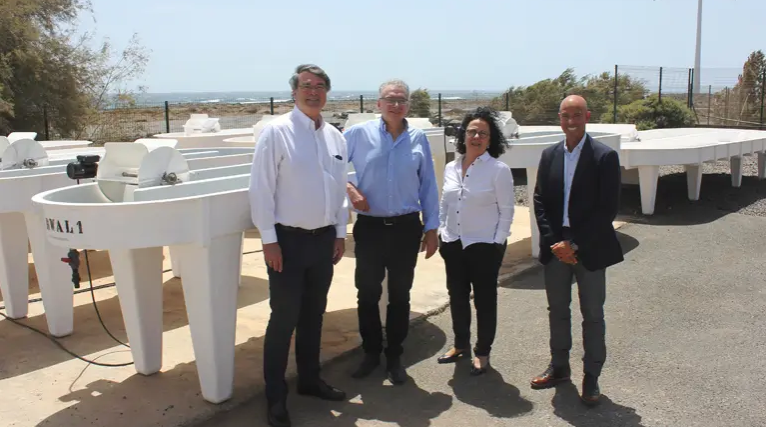
Rafael Larraz (left) R&D Director of Cepsa; Gabriel Megías Martínez, Manager of the Instituto Tecnológico de Canarias (ITC); Joana Frontela, Director of the Cepsa Research Centre; and Gonzalo Piernavieja Izquierdo, R&D coordinator of the ITC (photo courtesy Cepsa).
In Spain, multinational oil and gas firm Compañía Española de Petróleos, S.A.U. (Cepsa), a Mubadala Group company and the Instituto Tecnológico de Canarias (ITC) will promote the development of biofuels from microalgae. The research which is scheduled to be completed in the third quarter of 2024, is focused on producing feedstock that can be converted into sustainable biofuels and chemicals at Cepsa's Energy Parks, without the need to make any modifications to the plants and equipment.
According to Cepsa, this project is an example of open innovation, in which ITC will be in charge of cultivating these microalgae in water from industrial processes, and a joint team from both companies will carry out the hydrothermal liquefaction (HTL) process on the crop to valorize the biomass.
The HTL reactor, designed by Cepsa, will be used to obtain the raw material to be evaluated in the energy company’s pilot plants.
Ideal setting for algae
The cultivation of these microalgae, native to the Canary Islands, will be developed in the archipelago, which has a stable temperature throughout the year and a high availability of solar radiation, making it an optimal place for cultivation.
The initiative will boost the circular economy and will use raw materials of renewable origin, which do not compete with water resources or food.
In this sense, fresh water from the secondary treatment of a wastewater treatment plant (WWTP) is used, as well as brine from a desalination plant. The use of biofuels derived from these microalgae can reduce carbon dioxide (CO2) emissions by up to 90 percent compared to the use of fossil fuels.
This initiative takes into account sustainability and efficiency criteria at all levels of the process, and these raw materials are characterized by their high CO2 capture capacity, rapid growth, and high energy potential.
At Cepsa we are excited to join forces with the Canary Islands Institute of Technology to carry out this research. We are confident that this project will lead to great achievements in the production of biofuels that will drive the decarbonization of land, sea, and air transportation, and thus advance our objective of being a benchmark in the energy transition, said Rafael Larraz, R&D Director at Cepsa.Through its 2030 strategy, “Positive Motion”, Cepsa aims to lead sustainable mobility and the production of green hydrogen and biofuels in Spain and Portugal. Specifically, by the end of this decade, it will have an annual production capacity of 2.5 million tonnes of biofuels, of which 800 000 tonnes will be sustainable aviation fuel (SAF).
Innovation is one of the key levers for driving these objectives. For this reason, the company has tripled its investment in R&D&I this year compared to the previous year, aimed at researching different projects in the search for new sustainable energy solutions.
Dedicated algae research unit
For more than thirty years, ITC has been leading research and development projects on sustainable energy technologies in the Canary Islands to accelerate the massive integration of renewable sources in the island’s electrical system, being a key element to achieve the goal of climate neutrality by 2040, a target set by the regional government in the Climate Change Law.
The Canary Islands Energy Transition Plan, the roadmap for energy planning drawn up by the ITC on behalf of the regional Ministry of Ecological Transition, envisages reaching 60 percent of electricity demand with renewables by 2030.
In Pozo Izquierdo, on the island of Gran Canaria, the ITC has the Area of Technological-Industrial Development in Blue Biotechnology, a space dedicated to the experimentation and validation of processes and products related to marine plant aquaculture and the industrial exploitation of native strains of micro and macroalgae.
This physical framework houses the collaboration project between Cepsa and ITC, an initiative that is aligned with the Canary Islands Blue Economy and Circular Economy Strategies aimed at moving towards a production model based on intelligent and sustainable use of resources.
The multidisciplinary nature of the R&D that we address from ITC around the blue, circular, and green economies positions us as a technology partner in this pilot initiative of Cepsa for the energy recovery of native species of marine microalgae and especially motivates us to contribute from knowledge to the promotion of sustainable mobility with new fuels that help reduce the ecological footprint in the transportation sector, ended Gabriel Megías Martínez, Manager of the ITC.